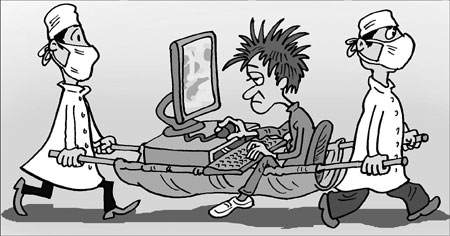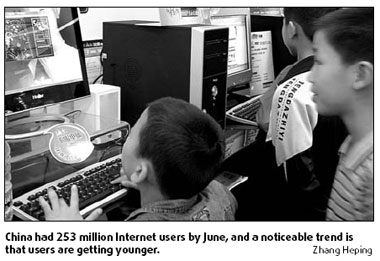Caught in the Web

For 23-year-old "Xiao M" surfing on broadband is an indispensable part of her life. But the postgraduate at Beijing Forestry University fears that a recently released official investigation into "Internet addiction" could change all this.
Health chiefs of the People's Liberation Army released a report on the subject in mid-November to address an increasing number of psychological problems allegedly resulting from Internet overuse.
Tao Ran, a psychiatrist at Beijing Military Area General Hospital, says it allows psychiatric units at hospitals to treat such cases.
Tao's research on Internet addiction dates back to 2004, when he set up the first medical center for addictive behavior at the hospital. The patients were being treated for gambling, tobacco, alcohol and drug addiction.
"In terms of frequency, Internet users can be categorized into normal users, excessive users and addicts," Tao explains. Typical symptoms of addiction include a yearning to be online, mental or physical distress, irritation, and difficulty concentrating or sleeping.
The definition, based on a study of more than 1,300 computer users with "problems", classifies an addict as someone who spends at least six hours a day online and has had at least one of the above symptoms in the past three months.
The diagnosis covers five types of addictive behavior: playing online games, seeking relationships, on-line buying and selling, watching pornography, and obtaining information. Even so, the focus is on game players.
"The addicts are recognizable because, first, they cause distress to themselves and those close to them; second, they have partially or totally lost the ability to function socially," Tao says.
Internet addiction has been steadily growing as more Chinese get online, Tao says. According to the China Internet Network Information Center, the country had 253 million Internet users by the end of June, and the number is rising by 240,000 a day. "A noticeable trend is that users are getting younger," Tao says.
Echoing his words, the China Youth Association for Network Development says Internet-addicted youths are more likely to suffer frustration in personal relationships than their peers.

Those aged 18 to 30 make up almost half of the online population in China. An earlier survey found that about 10 percent of young users were addicted, and about 70 percent were male.
More than 300 treatment centers have sprung up across China, but the absence of a standardized categorization has resulted in inconsistent diagnoses, Tao says.
"Treatment should be handled at a regular hospital. Eighty percent of addicts can be cured with treatment, which usually lasts about three months," he says.
Since 2006, more than 3,000 young people have been treated at the China Youth Psychology Development Center, an institution affiliated to Tao's hospital in suburban Beijing, where they receive three-month in-house treatment, including military drills, family therapy and discussion groups.
"What we do is offer tailor-made treatment that integrates medicine and psychological support," Tao says. But at up to 9,000 yuan ($1,320) per month, the service is too expensive for the average Chinese family.
The definition of Internet addiction has aroused widespread criticism and protest among Chinese Internet users.
"Professor Tao doesn't know the Internet or Internet games. His classification is quite childish," Xiao M says angrily.
"You can't put the blame on the Internet, which allows us to learn about the outside world and other people."
A psychology major, Xiao M disagrees that Internet games are the source of mental disorders. In high school, she started to play video games, such as Super Mario by Nintendo. In 2007, she began playing Internet games. Her favorite is World of Warcraft (WOW), a 3-D multiplayer role-playing game that she finds relaxing.
"I look for fun when playing Internet games, but I'm responsible," she says. The majority of online users are able to differentiate between real life and the virtual world, she adds. "Those who spend too much time on the Internet are most probably influenced by other psychological factors."
She believes Internet games are also social networks for the young. "Nearly everyone around me plays WOW and those who don't are deemed somewhat strange. We also have a set of rules when we play multi-person games."
Tao Ran's definition has provoked discussion among professionals as well. Liu Xiaolin, a psychological expert at Wuhan Mental Hospital, says Internet addiction is a kind of regressive behavior. "We should address the reasons for Internet addiction, rather than the behavior itself."
Tao Hongkai, another leading researcher on Internet overuse based in Wuhan, Hubei province, believes the origin of such an addiction lies in the failure of family education, exam-oriented education and inter-personal relations.
"The definition has no scientific basis, as addictive behavior cannot be simply measured by time," he says. "It's pseudo scientific."
More important for Xiao M is the impact of the definition for Internet addiction beyond hospital boundaries.
"Most of us don't have sufficient knowledge of psychology. If the definition is officially recognized, parents will tend to regard the Internet as negative or bad, and young people could be deprived of their freedom to choose. In China, the impact of morality and ideology is still very strong."
But Tao of the Beijing hospital is determined to press ahead: "We should become masters of the Internet, instead of its slaves."
(China Daily 12/22/2008 page8)














